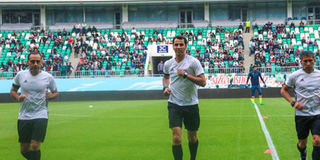Uzbekistan get behind World Cup's top referee

A picture taken on March 30, 2018 shows Uzbek referee Ravshan Irmatov (centre), 40, warming up ahead of a local football match in Tashkent.
When the World Cup kicks off in Russia next week, former Soviet Uzbekistan will be roaring on a remarkable referee rather than their national team. PHOTO | AFP
What you need to know:
- Ravshan Irmatov, 40, is something of a contradiction in international football and an unlikely hero in the central Asian state.
TASHKENT
When the World Cup kicks off in Russia next week, football lovers in Uzbekistan will be roaring on a remarkable referee rather than their national team.
Ravshan Irmatov, 40, is something of a contradiction in international football and an unlikely hero in the central Asian state.
Going into the tournament in Russia where at least two million Uzbek migrants live, Irmatov has officiated more World Cup matches than any other referee in history.
He is widely regarded as one of the top referees in the game. Yet the country he represents has never graced the sport's most prestigious event.
"They are getting closer all the time. This time they just missed out," the softly-spoken Irmatov told AFP as he warmed up for a clash between the Uzbek league's third and fourth-placed sides.
"Our people love football and our new president has made developing football a priority. I am confident we will see Uzbekistan at the World Cup soon, perhaps at Qatar in 2022."
It would not be surprising if Irmatov, who was the youngest referee at his first World Cup in South Africa in 2010, made it to that tournament, too.
Little-known in Europe prior to 2010, where he tied a record for the most matches refereed in a single tournament (five), Irmatov had already been named Asia's best referee two years running by the Asian Football Confederation.
He has now earned that honour a total of five times and has refereed the final of the Club World Cup twice, but still looks back on the opening match in South Africa, where he also refereed a semi-final, with special fondness.
"To be the youngest referee in the tournament and get selected to officiate a match people have been waiting for for four years was unbelievable."
"I felt like I was walking in a dream. I had to pinch myself," he said.
#IRMATOVBEST
Wherever Irmatov goes in Tashkent, Uzbekistan's capital of 2.5 million people, he finds himself accepting requests to pose for pictures and sign autographs. It is a celebrity that seems ill-suited to a man who exudes hard work and humility.
At a recent match pitting FC Bunyodkor against a team from the historic city of Bukhara, the announcement over the PA system of his name was greeted by a volley of enthusiastic applause.
During the tournament in Brazil in 2014, the hashtag #IrmatovBest trended on Twitter, as Uzbek users showered praise on their compatriot and lobbied — unsuccessfully as it turned out — for him to officiate the final.
But Irmatov's arrival on the world refereeing circuit was only made possible thanks to an injury that ended his playing career and a surprise induction into the world of officiating during a youth match in Tashkent.
"My father was in charge of a youth team and I was helping him. During one of their games, the designated referee did not arrive. My father gave me a whistle and said 'Do as best as you can,'" he recalled.
"I didn't have any yellow or red cards but it somehow clicked for me. I found that I got a lot of pleasure from refereeing."
PRESERVING FOOTBALL'S IMAGE
Uzbek interest in the tournament in Russia will be especially keen given the huge numbers of Uzbek citizens who live and work there and the relatively low cost of flights between the two countries.
For Irmatov, the dream of making it to Russia with his officiating team began the moment the Brazil World Cup wrapped up.
"We had to sacrifice a lot, work hard in every training session with one goal: to get to Russia," said Irmatov.
"Of course the fact that so many of our people will be there and will travel there means that it is a special opportunity to bring joy to our supporters."
But even if their focus will be firmly on the man wearing black shorts, Irmatov will be doing what he can to stay out of the limelight.
"A referee should not be going out onto the pitch trying to be the man of the match," he said.
"First and foremost our job is to preserve the image of football. As long as you respect the spirit (of the sport) and protect footballers from injuries, they will respect you, too."





